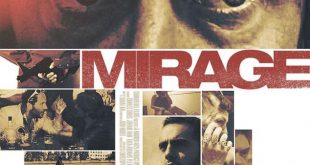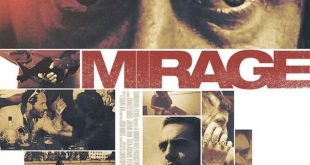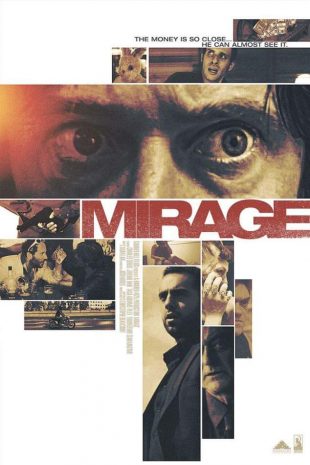
What made you want to get involved in filmmaking?
I have always loved movies but I think the first moment is when I watched Blade Runner as a kid on hia friend’s VCR : it was a shock, I wanted to walk in this dystopian L.A. 2019. It changed my life. It was so amazing I wanted to do the same.
Name three movies that inspired you and how?
Only three ?!! Damn, hard to choose… but here goes:
– Blade Runner for how Ridley Scott created a whole original universe and the place of the set up as a character in the story.
– The Good, the Bad and the Ugly for how Sergio Leone made his cast, everyone has a personality even silhouettes.
– Down & Dirty for how Ettore Scola wrote an amazing and smart script and for the real characters too.
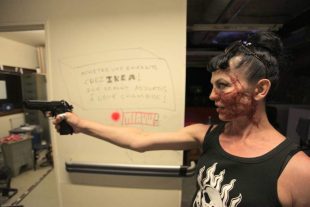
For those not familiar, please tell us about Mirage and what made you want to tell this story?
MIRAGE is the story of Charlie, a desperate photographer without any money, work and home, who is suffering from a serious eye disease that causes hallucinations. He’s slowly losing his sight and has a urgent need for money to get surgery. In exchange for paying for the surgical operation, his friend Tony, ruined by an unsuccessful attempt to cure his wife’s rare orphan disease, tries to convince Charlie to euthanize her, he is anxious to recover her life insurance. Without any hope, Charlie ends up agreeing to kill her by simulating a burglary that goes wrong. He quickly finds himself confronting the borders of reality.
I wanted to write a story about lost illusions. I love LOST ILLUSIONS and THE SPLENDORS AND MISERIES OF COURTESANS (or as A HARLOT HIGH AND LOW) by Balzac. Those two books are amazingly modern. I also had interest in propaganda especially since internet came into being. Books like THE RAPE OF THE MASSES by Sergei Chakotine or OBEDIENCE TO AUTHORITY by Stanley Milgram should be read by everyone to try to understand the crazy world we’re living in. I thought of the story of a photographer who, in becoming blind, loses sight of reality when I discovered Charles Bonnet Syndrome, a degeneration of the optic nerves that disrupts the functioning of the visual cortex and causes chromatic alterations and hallucinations.
Moreover, we are at a turning point. Communication problems are solved technically but not from a human point of view. It’s even worse. The gap between being and seeming to be is larger than ever. MIRAGE is also questioning about what is an image, what is cinema itself : the kingdom of possible could be without being real at the same time. Our image of reality is only the result of our mind interacting with this reality, not a perfect reflect of reality itself. Everything depends on eyes. I’m color blind. Meaning I don’t see the same range of colors as a « normal » person. So which reality is real ? Yours or mine ? Both, even if you see more colors than me. Take a horse, a cat, a bird, a fish, a spider or whatever, each living animal sees the world its own way.
I personnally think MIRAGE is a Dickian film noir about avarice and greed through the prism of the mirage of the self-seeking attitude. A fratricidal struggle in which nothing matters except one’s own interest, even if it is to the detriment of others. At a certain point, we’re all disposable heroes of hypocrisy. This story also speaks of the short-term vision of neoliberalism and how it can crush people.
I shot almost a dozen experimental movies and in 2009, I just finished SOMBRERO, a semi experimental dystopian short movie. I was reading Hitchcock Presents novels as I had in mind to make a film noir. So I thought about DIAL M FOR MURDER, DOUBLE INDEMNITY and DOA. The day I discovered Charles Bonnet Syndrome and the hallucinations it makes, I thought about MEMENTO, JACOB’S LADDER and Philip K. Dick whom I love.
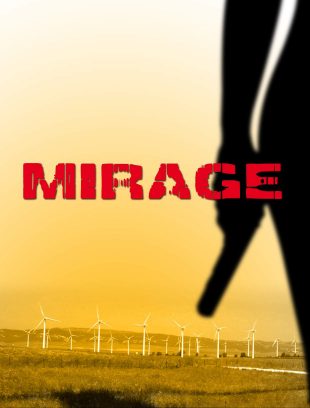
What sets Mirage apart from other films out there?
It’s a film noir which is a very classic genre but it flirts with surrealism.
Mirage looks like nothing else as it is set in an original modern urbanized world. It has its own aesthetic universe, not Paris nor New York nor anywhere else. This is is not common in a thriller. Normally this is reserved for sci-fi/fantastic movies. I wanted the plot to be set in an anonymous metropolis to decontextualize the story. I had in mind pictures, and urban atmospheres from East Europe where I’ve been quite a few times in recent years. I had already developed a constructivist atmosphere in SOMBRERO which is inspired by ALPHAVILLE. I have travelled a lot for the last 20 years and I was amazed to see the similarities in different main cities in Europe or Japan, Chile and the US. Which is normal because architects make buildings worldwide and thus the particularities of architecture due to the socio-cultural context vanishes. So, I extended the universe of SOMBRERO.
What also sets Mirage apart from other films out there is the fact that punk is part of its DNA and it gives personality. Not because it was 100% DIY, nor because there’s punk music as I asked friends who play in punk bands as such as Outreau, Warum Joe, Holy Holster, Panty Party, King Phantom, Louis Lingg and the Bombs, Spermicide (and a tune by Russian alternative rock band Sonic Death). Punks from Paris local scene got involved as did actors and technicians : Taga Addams, one of the main protagonists, is the bass player in Bollocks Breakers, Plex is the ex-frontman of hxc band Les Gnomes, Sean is the guitar player and frontman of Project Reject, Jano is bar co-owner of Paris punk bar the Holy Holster (where the bar scenes were shot) and guitar player in bands King Phantom, Holy Holster, Panty Party, Wunderbacht and features in legendary French punk band Warum Joe. And the crew was entirely punk : Ingrid, the sfx make up, is singing in the post punk Primal Shudders, Josh, the composer, is the guitar player of Louis Lingg and the Bombs, Toto, the sound designer and mixer, is playing guitar in Baffes ou Torgnoles.
Plus others people from Paris punk scene gave a hand at one point, some supported the crowdfunding or helped during the shooting such as John or Julien who helped for the underground sequence. Or Milou, the man who saves a sequence of the movie by making it possible for us to shoot in Stendhal Squat in Paris before it was closed.
Mirage is not a punk movie, but it was made like a punk record. And it was also influenced by Italian neorealism too. No perfect hero fighting to save his girlfriend and mankind in a binary good guys / bad guys world, no revenge mood to justify violence. Mirage tells the story of ordinary people struggling with their own avidity and individualism. Technically, like neorealism, it was shot on location, I used natural light and the actors are mostly non professional.
Did Mirage go through many changes from script to film?
Yes and no. The basis of what happened in the scenario didn’t change. But the production was such a house of cards, there were definitely going be some changes, as the budget only just covered food and transport.
For example, there was a gun fight setting in the streets of Paris at one time in the original screenplay. And when 11/13 attacks happened in 2015, I realized I wouldn’t be able to film this, meaning a bunch of people with guns in the streets of Paris without any production…
The worst thing happened during pre production. A friend, who sold an appartment, told me during July 2015 he would give me 10,000 euros, half of the original budget, to make the movie. I looked for another 10 through crowdfunding in January 2016, which was the beginning of the pre production. And then, he changed his mind… That was the worst surprise ever, which killed the crowdfunding and the 2 years of works to set up the shooting part in Lithuania and Spain… and almost killed the project. No one wants to invest thinking I wasn’t trustworthy, just a pathological liar… So, I didnt get even 2,000 through the crowdfunding… And I was able to find 3,000 as I’m not especially rich. And as the budget dropped from 20,000 to 5,000, I had to cut most of the action scenes as they’re always the most expensive : my original plan for the end was to set a gnarly gun fight between eight characters in a field and explode a car in Vilnius area. I finally had to rewrite the end twice. We were also supposed to shoot in Andalucia in South of Spain because I have a friend there who owns a ’69 Fiat Dino which should have been in the movie for the road trip part.
There also was one big change about a character’s destiny which had consequences on the plot : cancellation of scenes and writing new ones and half a dozen small changes, mainly locations as there are around 20 of them in the movie.
A movie is not a novel as you have to adapt to the reality of what a shooting is. That’s part of the creative process of filmmaking especially on this no budget movie. Improvisation and adaptation make you more creative as you need to fix problems without any money.
What was the biggest obstacle that you faced during filming?
Planning was the biggest pain in the ass. Doing all the 40 days of shooting by myself alone without any crew meaning I was working flat out. I slept like 3-4 hours per night during the four month period of shooting and I needed an average 3 days to set up one day of shooting. I was doing like maybe 10 positions : director, director assistant, producer, director of photography, soundman, location manager, costume, runner, etc… organization was the key.
Do you have a favorite scene?
No.
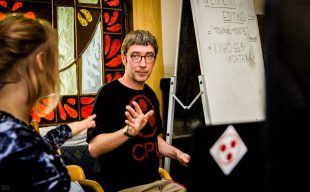
In making Mirage, what has been most rewarding to you so far?
The film exists ! On one hand, I can’t believe I was able to shoot 119 scenes alone with a DSLR, no crew, no lights and a budget of 5,000 euros. I’ve worked in media for more than 20 years now and I know how tough a shooting can be whatever the budget is. Each morning of the shooting period, I thought “today might be the last day but keep working, you never know”. I was so convinced something would go really wrong and kill the project… You can’t control everything so, at one point, you have to do what you have to do and let it go with the flow. I feel lucky enough to have completed the shooting and glad I wasn’t wrong to make it DIY in spite of the attitude of lots of people thinking I was a fool and it was impossible to make a feature in such spartan conditions.
What advice would you give other filmmakers as they take a similar journey?
“They didn’t know it was impossible so they made it” (Mark Twain)
What’s next in your filmmaking career?
Make another one with a budget if possible.
 Horror News | HNN Official Site | Horror Movies,Trailers, Reviews
Horror News | HNN Official Site | Horror Movies,Trailers, Reviews
